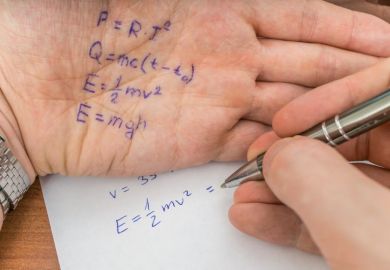A €7 million (£6.2 million) tool designed to stamp out cheating in online assessment is preparing for launch after successful European trials.
The Adaptive Trust-based E-assessment System for Learning (Tesla), funded by the European Union, combines anti-plagiarism software with facial-, voice- and keystroke-identification technology.
More than 27,000 students at seven European universities, including the UK’s Open University and the Open University of Catalonia (UOC), have now taken part in trials of the tool.
Denise Whitelock, professor of technology-enhanced assessment and learning at the UK’s OU, said that Tesla had “had a good response” and had proved to be a robust anti-plagiarism tool.
It will be developed into a product available for purchase by universities, albeit with a “basic” version likely to be made available free of charge, after the research project concludes in March.
A key weakness of many existing online assessment systems is that they may allow a student to enlist a substitute to do work in their name by giving that person their username and password, or may allow a student to enter their details to start an exam and then have someone else take it for them.
Using technology to verify the identity of people sitting online exams – be it through their appearance, the sound of their voice, their way of typing or their manner of writing – could improve the reputation of online qualifications. It could also reduce online providers’ costs by sparing them the need to conduct face-to-face assessments.
Anna Elena Guerrero, the project coordinator at the UOC, said that students initially found the facial recognition software to be “the most intrusive” element of the tool. However, those involved in more than one round of piloting often ended up changing their perceptions. “In the beginning they felt that facial recognition was very intrusive, but later that decreased,” she said.
“Mainly students saw Tesla as an advantage, because they can save time on commuting or they feel it makes their degree stronger,” Dr Guerrero said. “It will also be good for companies that are going to hire these kinds of people [who take online courses] to know that we can identify authorship and that the qualifications are robust.”
Professor Whitelock said that universities could eschew biometric identification in the tool, but added that it might be best to employ it while making it “very clear where this data will go”. “Students are used to sitting in an exam room; we need to educate people about the software and explain the advantages,” she said.
Last year, researchers at Arizona State University reported success in detecting cheating in online assessments by tracking whether students tilted their heads to read material off-screen and whether they paused before answering questions.
Another OU research project explored using webcams to monitor students’ engagement and emotions via their facial expressions or eye movements, in a bid to improve retention and course design.
Register to continue
Why register?
- Registration is free and only takes a moment
- Once registered, you can read 3 articles a month
- Sign up for our newsletter
Subscribe
Or subscribe for unlimited access to:
- Unlimited access to news, views, insights & reviews
- Digital editions
- Digital access to THE’s university and college rankings analysis
Already registered or a current subscriber?








